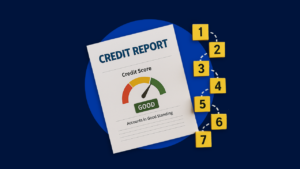9 bad money habits that you should break right now

Like brushing your teeth or getting enough sleep, the first step to developing effective financial habits is to break out of the bad ones.
Many Americans are struggling to save. According to Bankrate’s emergency fund report, only 43 percent of people say they could pay for a $1,000 emergency expense from their savings. A great way to start saving is by recognizing what bad money habits you have and committing to a plan to leave them behind.
Here are nine of the most common bad money habits and how you can break out of them.
1. Not having specific savings goals
Setting specific savings goals is important not only for the sake of knowing how much you need to save, but also to give you a tangible reason to save.
If you don’t have specific savings goals, you may not be deliberately thinking about how much you should be saving and what strategies to undertake to meet those goals. Breaking out of this habit will help set the stage for every other savings habit — and it’s an easy place to start.
Take some time now to write down what goals you have, including both short-term goals, such as a vacation or down payment for a house, and long-term goals, such as retirement. You’ll want to factor these goals into your budget along with an end-date target. Then, you can set aside a certain amount of money each month to meet those goals within the desired time frame.
2. Overspending on nonessentials
There are a number of ways we might be spending on nonessentials that build up over the course of a month. Impulse purchases can add up. Then before you realize it, you’ve already spent much more than you intended on these discretionary items you don’t really need.
If you’re a frequent window shopper, consider this strategy to help overcome the habit: Next time you see a nonessential item you want to buy, write it down on a piece of paper or your phone’s notes app and wait a few days before buying it. After that time passes, you might find that you no longer have a desire for the item, and you can save what you would’ve spent on it.
Also, try making a shopping list before you go out to buy stuff. You can tailor the shopping list to ensure you get everything you need and stick within your budget. It might stop your eyes from wandering to other wants and serve as a reminder to not overspend.
3. Letting debt accumulate
The average American household carries about $101,915 in debt, according to Debt.org. It’s become a norm for consumers to amass large amounts of debt and then bear the burden of attempting to pay it off slowly over time.
Personal loan debt, student loan debt and credit card debt are some of the factors that might contribute to your overall debt. If you let these balances accumulate and only pay off the minimum each month, you’ll end up paying more in interest over time and delaying your ability to overcome debt and start saving more.
To break out of debt, first make a list of all the debts you owe, their annual interest rates and when their payments are due. Then, you can begin working on a plan to find more room in your budget to make payments toward those debts. You may want to prioritize those with the highest interest rates first, according to the avalanche method, or those with the smallest balances first, according to the snowball method.
If you have federal student loan debt, craft a plan to ensure you make payments on time once repayment starts again in October 2023. Federal loan borrowers have several income-driven repayment plans to consider that could help them minimize those monthly payments.
4. Not planning ahead with a budget
Without a budget, you’re not tracking expenses, savings goal progress or what you have available for spending money. A budget is, quite simply, your guide to your own money — without it, it’s easier to fall into negative spending habits.
When planning out a budget, make sure to account for wants, needs and savings. According to the 50/30/20 rule, a common budgeting tactic, 50 percent of your income should go toward needs, 30 percent toward wants and 20 percent toward savings. It might be a good idea to even underestimate your monthly income slightly, so you have a bit more flexibility with your spending and don’t end up feeling constricted by the end of the month.
5. Waiting to save until after you’ve already spent your paycheck
Even following a budget, it’s easy to neglect savings and end up spending more than you had planned. One common bad savings habit is depositing money into your savings account at the end of the month after you’ve spent on wants and needs. This can lead to saving only the small leftovers of your monthly income and enable you to cut into those savings while they’re still very accessible.
To combat this habit, stash the portion of your respective savings away in a savings account as soon as the paycheck is deposited. Savings accounts usually allow only a limited amount of certain transactions each month, so you’ll be less inclined to break into those savings and spend your saved money.
Some finance apps can automate the savings process by moving a certain amount of your paycheck into a savings account for you once the funds are deposited.
6. Having no emergency fund
According to Bankrate’s 2023 emergency fund report, 57 percent of U.S. adults are uncomfortable with their level of emergency savings. Many may not be contributing to an emergency fund at all, or have ended up prioritizing other savings goals, leaving little to their emergency fund.
Though higher inflation has made budgets tight, it’s still important to make room for emergency savings. These savings are what help to ensure you can cover unexpected expenses and avoid piling on more debt by paying for such expenses using a credit card or a loan.
To start building an emergency savings fund, see where you can make minor changes across different categories of your budget to stash more, and also save any windfalls (such as a tax refund). Consider keeping your emergency savings in an online high-yield savings account, since these accounts tend to have much higher yields than traditional savings accounts.
7. Relying on cash advances
While cash advances may be necessary in some cases to make ends meet, relying on them too often can lead to an endless cycle of debt. Cash advances might include early payday loans, overdraft protection or buy now, pay later (BNPL) services. They all have one thing in common: Allowing you to spend money you don’t currently have.
Cash advances can make it feel like you’re spending free money, but they all require you to pay the advance back eventually, and you might end up struggling to do so, building up greater debt and financial stress. They also frequently come with costly fees. Overdraft fees, for example, average $29.80 per transaction, according to the most recent Bankrate checking account survey.
Instead of relying on cash advances, consider other ways you can make room for expenses. Establishing an emergency fund or taking on a side gig are two ways you can account for new expenses. If you frequently overdraw your account, you may want to opt out of overdraft protection to stop incurring overdraft fees.
8. Not paying attention to savings account rates
You might not realize how much interest rates fluctuate on savings accounts, but the gap between the lowest and highest savings rates has been growing wider and wider. Today, some of the highest-yielding accounts have annual percentage yields (APYs) of up to 5 percent, while many traditional, big banks are still only offering 0.01 percent APYs on their savings accounts.
According to a recent Bankrate survey, 16 percent of Americans say they’re earning no interest, while 14 percent say they’re unsure what their interest rate is. If you don’t know your own savings account rate, you likely don’t know what other financial institutions are offering on their accounts — and what you might be missing out on.
Moreover, if you have multiple savings accounts, paying attention to how each of their interest rates varies will help you determine where to keep more of your savings to maximize the return you’re getting.
9. Using out-of-network ATMs
One of the most common types of bank fees that eat into consumers’ wallets is ATM fees, which include out-of-network fees and surcharges from your bank. The average combined fee amount for using an out-of-network ATM is $4.66, the highest since 2019, according to Bankrate’s latest checking account survey.
If you don’t pay attention to fees, they can really add up over time. Say you withdraw cash from an out-of-network ATM twice a month. At the average fee amount, that would amass over $100 in ATM charges in a year.
You can avoid receiving these charges by avoiding out-of-network ATMs. Try checking the bank’s website or your mobile banking app’s ATM locator to take stock of where nearby in-network ATMs are. Alternatively, consider switching to a checking account that refunds ATM fees.
Bottom line
Our financial well-being is heavily influenced by our habits. Recognizing these habits is the first step to reshaping your financial narrative.
The process toward financial well-being isn’t about perfection, but rather learning from past errors and making consistent improvements. By consciously adopting better money practices, consumers can actively choose a path of informed decisions and financial growth.
Why we ask for feedback Your feedback helps us improve our content and services. It takes less than a minute to complete.
Your responses are anonymous and will only be used for improving our website.






